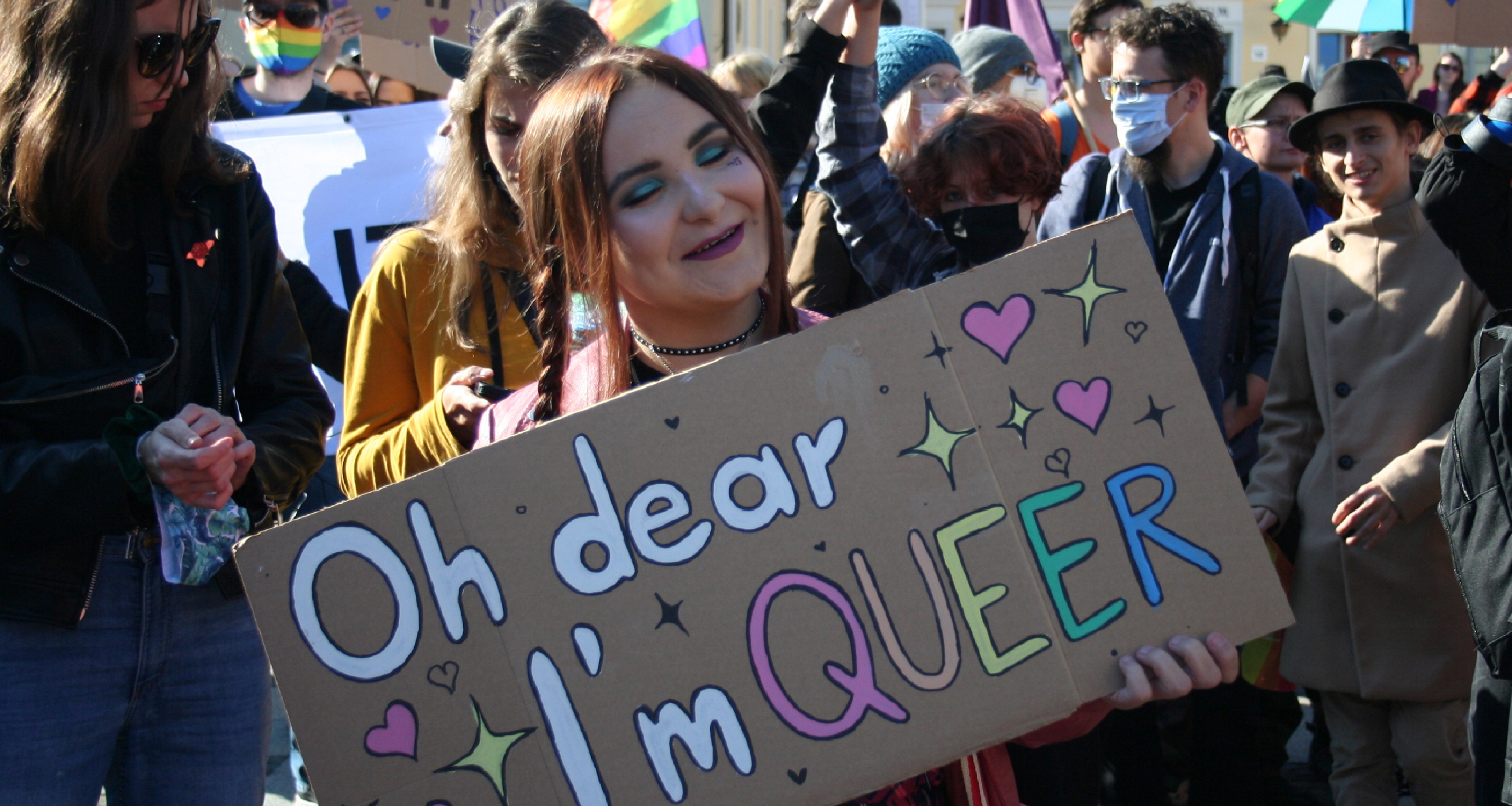Bialystok Pride: Polish LGBTQ people march defiantly in a city surrounded by ‘LGBT-free zones’
Dan Glass reports from Bialystok Pride in Poland, which was the scene of violence in 2019 after far-right extremists attacked the parade.
By Will Stroude

Words: Dan Glass; Images: Supplied
I’d never cried on the dancefloor until Bialystok Pride.
It wasn’t just that this year’s Pride in northeast Poland’s largest city was packed with 2,000 queers and their allies singing in the sunshine; it was because it was a drastically different event from the last.
Two years ago, before the Bialystok Pride parade had even started, a torrent of far-right homophobic hooligans chucked firecrackers, bottles and bricks at the marchers. This hate-filled horror-show came amid an escalation of hate throughout Poland, sparked when the Mayor of Warsaw declared that sex education in schools should be implemented to World Health Organisations standards, with reference to LGBTQ issues.

Białystok in northeast Poland sits less than 60km from the border with Belarus and is home to around 300,000 people. The surrounding Białystok County has declared itself an ‘LGBT-free zone’ (Image: Wiki Commons)
Two years later and we are in the midst of a queer uprising against the Polish government’s Nazi-esque ‘LGBT-Free Zone ideology’, which has seen 30% of council regions declare themselves unwelcoming of so-called ‘LGBT ideology.’ This time, us queers are firmly in the fascists’ line of fire.
Jakub, one of the Bialystok Pride organisers, was welcoming the crowd from the float on that fateful day in 2019 when an incoming bottle struck his elbow. His boyfriend Lukasz was looking after his friend; a wheelchair user under whose chair the thugs lit firecrackers. Surrounded by debris, Jakub and Lukasz bravely decided to continue marching.
Traumatised, Lukasz and Jakub could have decided to stay at home in 2021, but they know they have a job to do. Community members traditionally travel between cities to offer strength during Pride, and this time the masses came to lift the spirits of Bialystok.

After a hoax bomb threat that turned out to be a scare tactic, the trucks set off, blasting out ‘Imagine’ by John Lennon. Off we went, chanting ‘Slodcy chlopcy narodowcy’ – which translates as ‘Cute Nationalist Boys’ – to all the unimpressed male onlookers cordoned off behind police lines.
Three hours later and the march was a victorious success. Sitting in the pub afterwards with Lukasz, Jakub and fellow organiser Joanna, I ask them how they are.
“Remembering 2019, it was so nice. I came to Bialystok stressed and I’m so proud of myself and other people because it’s really hard to come back. We, the LGBT+ people in Poland, are brave,” smiles Lukasz.

“Instead of bricks we had fun and joy this year”, says Jakub. “We were better prepared this time and so the march was brilliant. The counter-demonstration was small.”
Whilst 2019’s ‘Battle of Bialystok’ marked a low point, the gravity of what our Polish queer family are continuing to face deeply struck me. The ‘LGBT+ Free Zones’ are a Machiavellian form of social control that is just as dangerous as if it was legally enforced: the mentality seeps into the atmosphere as thick fumes; a psychological warfare that seeps into the collective consciousness and compounds and encourages societal homophobia until it becomes sanctioned by mob rule. As a queer Jew of Polish heritage – my grandmother saw the sky ablaze as the Warsaw ghetto burned down in the distance – I know this too well.
Asking about the uprising, Lukasz said “‘The ‘Powstanie’ (Warsaw Uprising) can teach us so much. Back in 1943, there were teenagers in the uprising and like many there today, they were ready to die for their freedom.”
Joanna added: “The Warsaw Uprising survivors made statements in support of us, which has led to a cultural shift in the last two years. The nationalists, for whom the uprising is a big part of their mythology, are some of the fiercest counter-protesters during prides, and now they don’t know how to react to their words. It gives us hope that you see us, that we have disarmed this hate.”

“It gives us hope that you see us … we have disarmed this hate.”
At the Bialystok Pride after-party, queuing in the cold night air, Lukasz puts his hand on my arm and says, ‘Dan, my activism was born here in this town in 2019. I was a Catholic Priest for nine years until two years ago I realised I can’t be ignorant anymore … when thunderbolts are being poured out on homosexuals. So I became one of the first priests in Poland to come out.”
Lukasz fell in love with Jakub at his first Pride and the following year they went to Bialystok. After the attack they moved together to Warsaw, and now help run the first LGBT+ homeless shelter there for thousands of young people seeking sanctuary.
We step down into the club together to bear witness to the first drag night in the history of Bialystok.
“Well done everyone! LGBT+ people now have space in Bialystok,” our host Tomek declares as they beam to the crowd.

‘Strajk kobiet’ translates to ‘Women’s strike’
It’s not lost on those at Bialystok Pride that they are changing the course of history: they wanted a different destiny than the one signified by the memorial for Bialystok Jews they marched past earlier that day. As Piotr Buśko, one of the organisers of Wroclaw Pride, says: “The wind of change is blowing and it’s coming from people’s lungs! We are the legacy and memory of queer people and minorities who lived before us.’”
Next year is the 50th anniversary of Pride in Britain. Its continued mission is ‘absolute freedom for all’ as Andrew Lumsden, a founding member, reminds us: “Criminalise one bunch of queers and you criminalise all queers by association.”
Dan Glass is an award-winning activist, educator, academic, performer, consultant and writer. Follow him on Twitter.
